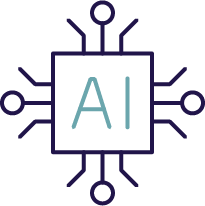Brief: AI In Sales Is Progress But Not A Panacea
Sales performance improvement

Published: January 16, 2019
What are the risks or downsides of using AI in sales?
The biggest downsides of using AI in sales are that it can sound robotic if not personalized, and it might introduce bias if it’s trained on bad data. There’s also a risk of reps relying too much on automation and losing critical thinking.
Sales leaders need to adopt AI tools that support your team, not replace them, and keep humans in the loop. Before the current AI boom, in 2019 we released our white paper, “AI in Sales is a Progress, Not a Panacea” that highlighted the potential of using AI as a sales tool, but recognizing it’s limitations. This article predicted how AI would impact businesses in the current landscape—and we’re seeing this foresight come to life.
Learn the key challenges to using AI as a sales tool in our white paper, “AI In Sales Is Progress But Not A Panacea.” You’ll explore:



How inaccurate or incomplete CRM entries, human bias, and the inability to capture emotional nuance can all limit AI’s value and even steer sales strategies off course.
Why sales professionals risk losing critical thinking skills and adaptability when they overly depend on AI-generated suggestions.
How AI can unintentionally distance sellers from buyers, weakening the relationships that drive trust, connection, and long-term success.
Using AI in Sales: Progress, Potential, and Pitfalls to Avoid
AI has carved out a powerful role in today’s sales landscape. From streamlining workflows to uncovering insights in real time, using AI in sales is no longer a futuristic idea—it’s happening now.
But while artificial intelligence offers immense value, it’s not a cure-all. Using AI in sales comes with challenges that demand careful strategy and leadership. The key is to embrace AI not as a replacement for human insight, but as a complement to it.
AI Is Only as Good as the Data It’s Fed
Much like the infamous "Mechanical Turk" hoax of the 1700s—a machine that pretended to play chess but was secretly operated by a human—AI systems only appear smart when they’re powered by strong, accurate inputs.
The Problem:
- Over half of organizations still rely on manual data entry for CRM systems.
- Poor data quality leads to flawed AI-driven decisions.
- Some key buyer behaviors—like emotion, trust, or intuition—aren’t quantifiable and therefore invisible to AI.
Takeaway: AI can't interpret the nuanced, subconscious motivations behind a purchase. And if your data is biased or incomplete, the AI’s guidance will be too.
Using AI in Sales May Erode Critical Thinking
AI can offer recommendations—but overreliance on it can dull reps’ thinking. Sales professionals thrive when they wrestle with complex challenges: shifting buyer needs, risk tolerance, or internal stakeholder resistance.
Key Concerns:
- AI tools often rely on a fixed pool of strategies, limiting adaptability.
- Reps may miss out on developing critical skills like negotiation or objection handling.
- Empathy, which is vital to navigating emotional decisions, remains outside AI’s reach.
Takeaway: The best sellers evolve by thinking, not just following prompts. Use AI to spark ideas—not to outsource judgment.
AI Can Complicate the Sales Relationship
The customer relationship is the bedrock of successful selling. Yet using AI in sales can unintentionally create distance between the buyer and the rep.
Examples from the Field:
- AI may cause a “diffusion of responsibility”—reps rely on the tool instead of owning the outcome.
- In team selling environments, AI struggles to coordinate the emotional, strategic, and contextual demands of multi-person buyer groups.
- Even major AI projects (like IBM Watson) have failed due to poor calibration with human language and tone.
Takeaway: Reps need to stay at the center of the relationship. AI should support—not substitute—the personal connection that builds trust.
Recommendations for Sales Leaders
To harness the benefits of using AI in sales without losing its human advantage, Richardson outlines four critical leadership steps:
- Proceed with Caution
- Use AI as a Supplement, Not a Strategy
- Question the Data
- Train Teams to Think With and Beyond AI
AI is a Tool—Not the Final Call
AI is a powerful asset—but it’s only one voice in the room. Like instant replay in sports, it provides new angles, but the human referee makes the final decision. For sales organizations, using AI in sales is about perspective—not passivity. AI should serve as another data point offering a sharper perspective, not produce the final call.
